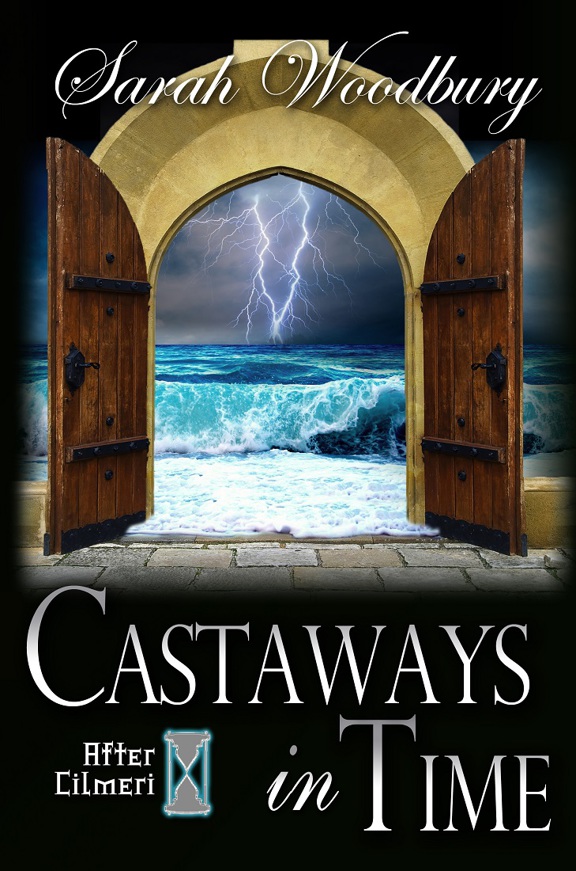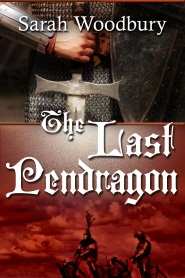Exiles in Time (The After Cilmeri Series) (37 page)
Read Exiles in Time (The After Cilmeri Series) Online
Authors: Sarah Woodbury
Tags: #medieval, #prince of wales, #middle ages, #historical, #wales, #time travel fantasy, #time travel, #time travel romance, #historical romance, #after cilmeri

Castaways in
Time

With a scarlet fever epidemic raging
throughout London, a rogue baron on the loose, a new baby keeping
him up at night, and a kingdom to run, the last thing David has
time for is a trip to the twenty-first century. But as he should
know by now, time waits for no man, not even the King of England
…
Release date: September 24,
2013
Look for
Castaways in Time
wherever ebooks are
sold.
Thank you so much for
continuing with the
After Cilmeri
series. It’s readers like you who make my job the
best in the world! If you haven’t already, and would like to know
when I have a new release, you can enter your name into the side
bar on my web page:
http://www.sarahwoodbury.com/
Meanwhile, keep reading for
the first chapter of
The Last
Pendragon
, the first book of another series
set in Dark Age Wales:
Sample:
The Last Pendragon

What if the myths and
legends were once real? What if gods and demons really walked among
us?
He is a king, a warrior, the last hope
of his people—and the chosen one of the sidhe.
Set in 7th century
Wales,
The Last Pendragon
is the story of Arthur's heir, Cadwaladr ap
Cadwallon (Cade), and his love, Rhiann, the daughter of the man who
killed Cade's father and usurped his throne.
Born to rule, yet without a kingdom,
Cade must grasp the reins of his own destiny to become both
Christian king and pagan hero. And Rhiann must decide how much she
is willing to risk to follow her heart.
The Last Pendragon
is a 98,000 word (430 page) tale of the
supernatural set in Dark Age Wales.
Chapter One
Aberffraw, North Wales, Kingdom of
Gwynedd
655 AD
Rhiann
T
he smell of smoke and sweat filled the hall, mingling with the
overlay of roast pig and boiled vegetables. More soldiers than
usual sat at the long tables, here to celebrate their victory. The
mood was subdued, however, not the wild jubilation that sometimes
accompanied triumph and caused Rhiann’s father to lock her in her
room in case he couldn’t control the men.
Today, the drinking had begun in
earnest the moment the men had returned from the fight and settled
into a steady rhythm Rhiann had never quite seen before. Here and
there, a hand clenched a cross hung around the neck or an amulet
against the powers of darkness, that should her father see, might
mean death for that soldier. For a man to ask the gods for
protection instead of the Christ meant he was less afraid of the
King of Gwynedd than someone, or perhaps something, else. Rhiann
had been afraid of her father her whole life and couldn’t imagine
fearing another more, not even the demons that were said to walk
the night, hungering for men’s souls.
Perspiration trickled down the back of
Rhiann’s dress, made of the finest blue wool that her father had
gotten in trade from merchants on the continent. The country folk
jested that sheep outnumbered men in their lands. Like the
shepherds who traveled through the mountains with them, they were
also tougher here than those in warmer, dryer climates and their
wool not as soft. The Saxon threat was enough to keep the Cymry
within their own borders, but the sailors still took to the western
seas, bringing in trade goods of wine, finely wrought cloth,
metalwork, and pottery.
For once, Rhiann’s father, King
Cadfael of Gwynedd, had eaten little and drunk less. For her own
preservation, Rhiann had always been sensitive to his moods and
noted the exact instant his disposition changed. He shifted in his
seat and rolled his shoulders, like a man preparing for a battle
instead of the next course of his meal. A moment later, the big,
double doors to the hall creaked open, pushed inward by two of the
men who always guarded them. The rain puddled in the courtyard
behind them and Rhiann wished she were out in it instead of here;
anywhere but here.
She kept her place, standing behind
and to the left of her father’s chair. It was her duty to tend to
his needs at dinner as punishment for her refusal to marry the man
he’d chosen for her. Rhiann hadn’t turned the man down because he
didn’t love her, or she him; she knew better than to wish for that.
It was a hope for mutual respect for which she was holding out. But
even this seemed too much to ask for an unloved, bastard daughter.
Consequently, Rhiann spent her days as a maidservant, albeit one
who worked above stairs. She didn’t regret her station. As the
months had passed, she’d come to prefer it to sharing space at the
table with her father and his increasingly belligerent
allies.
Silence descended on the hall as two
of King Cadfael’s men-at-arms entered, dragging between them a
young man whose head fell so far forward that no one could see his
face. He was visibly collapsed, with his arms dangling over the
guard’s shoulders and his feet trailing behind him. As the trio
progressed along the aisle between the tables toward the King’s
seat, the youth seemed to recover somewhat, getting his feet under
him and managing to keep up with their strides. As he came more to
himself, he straightened further.
By the time he reached the
dais on which Rhiann’s father sat, he was using the men-at-arms as
crutches on either side of him. Because he was significantly taller
than they, it was even as if he was hammering them into the ground
with his weight. His footsteps rang out more firmly with every
stride, echoing from floor to ceiling, matching the drumming of
Rhiann’s heart. The closer he got to her father, the harder it
became to swallow her tears.
By the souls
of all the Saints, Cadwaladr, why did you come?
Rhiann had been her father’s prisoner
her whole life, unable to escape his iron hand. The high, wooden
palisade that circled Aberffraw had always signified prison walls
to her, rather than a means to protect her from the darkness
beyond. This young man had grown up on the other side of that wall.
He’d not had to enter here. He’d had a choice, but had recklessly
thrown that choice away and was now captive, just as she was. She
felt herself dying a little inside with every step he took as he
approached Cadfael.
The young man, Cadwaladr, the last of
the Pendragons, fixed his eyes on those of the woman sitting beside
the King. She was Alcfrith, Cadfael’s wife, taken as bride after
the death of Cadwaladr’s father. Rhiann couldn’t see her face, but
from the back, the tension was a rod up her spine and her shoulders
were frozen as if in ice.
“
Hello, Mother.”
Cadwaladr’s lips were cracked and bleeding, puffy from the beating
that had bruised the whole length of him. Rhiann had heard they’d
as close to killed him as it didn’t matter, but from the look of
him now, the men-at-arms to whom she’d spoken had
exaggerated.
“
Son.” Alcfrith’s voice as
stiff as her body.
Rhiann’s father ranged back in his
chair, legs crossed at the ankles to project his calm and deny the
importance of the moment. “Foolish whelp. I’d thought you’d put up
more of a fight, not that I regret the ease of your defeat. This
will allow me to reinforce my eastern border more quickly than I’d
thought. Penda will be pleased.”
“
You and I both know why my
company was not prepared for battle today,” Cadwaladr
said.
Cadfael shrugged. “Your men are dead
and you a shell of a man. What did you think? That the people would
welcome you? That I would let you take my lands?”
“
My lands,” Cadwaladr
said.
Rhiann’s father sneered his contempt.
He reached out an arm to Alcfrith and massaged the back of her
neck. She didn’t bend to him. If anything, the tension in her
increased. “You meet your death tomorrow, as proof of your
ignobility.”
Cadfael waved his hand to Rhiann,
signaling her to refill his cup of wine and that the interview was
over. She obeyed, of course, stepping forward with her carafe. The
guards tugged on Cadwaladr, but as he moved, Rhiann glanced up and
met his eyes. It was only for a heartbeat, but in that space it
seemed to Rhiann that they were the only ones in the room. She
expected to see desperation and fear in him, or at the very least,
pain. Instead, she saw understanding. She could hardly credit it.
When had she ever known that?
“
You’re wrong, Father,”
Rhiann said, as the guards hauled Cadwaladr away. “Cadwaladr comes
to us as a defeated prisoner, and yet, he has more honor, more
nobility, than any other man in this room.”
“
He is the Pendragon,”
Alcfrith said, with more starch in her voice than Rhiann had heard
in many years. “Cadfael can’t change that, even by killing
him.”
Rhiann’s father snorted a laugh into
his cup before draining it. He didn’t even slap the women down, so
sure was he of his own omnipotence. “You may keep your dreams.” He
pushed himself to his feet and turned to leave. “The dragon is
chained; the prophecy dead.”
Rhiann had heard about Cadwaladr her
whole life. As a child, men in Cadfael’s court had spoken of him as
if he were a demon from the Underworld, or worse, a Saxon, coming
to steal their home like a thief in the night. Later on, as she
began to piece the story together, she realized that he was only a
little older than she was, twenty-two now to her twenty, and their
words said more about their own fears than Cadwaladr’s
power.
Rhiann’s father had married
Cadwaladr’s mother after Cadwallon’s death in battle, many miles
from Aberffraw. The High Council of Wales had wanted peace in
Gwynedd, in order to focus the concerted attention of all the
native British rulers on the threat of the encroaching Saxons.
Throughout Rhiann’s life, the Saxon kingdoms had been growing in
number and power. Two centuries before, the British kings had
invited them in, but once here, could no longer control them. The
Saxons had overrun nearly all of what had been British lands only a
few generations before.
By now, everyone knew that the Saxons
wouldn’t be returning to their ancestral lands across the water any
time soon. Her father, Cadfael, and Cadwallon before him, had
allied with Penda of Mercia, but it had left a sour taste in the
collective mouth of their people. All the Cymry knew that it was
only a matter of time before the Saxons turned their gaze
covetously on Wales.
The Council had settled upon Cadfael
as the man to impose peace amid the chaos of constant war, provided
Alcfrith agreed to the marriage. Rhiann suspected that ‘agreed’ was
too positive a word, and like most noble women, Alcfrith had had
little choice in the matter. While the High Kingship had never
materialized, and he didn’t even rule all Gwynedd like Cadwallon
had, Cadfael did control a significant piece of it: Cadwaladr’s
birthright, as he’d said.
What Alcfrith had not done upon her
marriage was give up her son, instead sending him away to be raised
by another. Rhiann’s father had raged at Alcfrith time and again,
demanding to know to whom she’d given him. Alcfrith had refused to
say, and perhaps that was the bargain she’d made—safety for her
son, in exchange for her allegiance.
